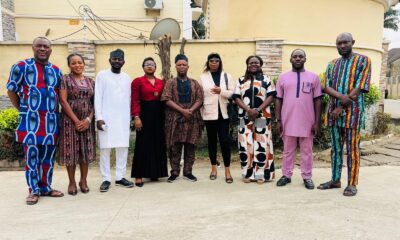News
Hardship: Middle-Class Nigerians now begging – Chimamanda Adichie

Celebrated Nigerian author Chimamanda Ngozi Adichie has voiced her distress over the worsening economic conditions in Nigeria, lamenting how it has plunged many formerly stable middle-class citizens into hardship and begging.
Speaking during an interview on Channels Television’s Amazing Africans, Adichie emphasized that the suffering of ordinary Nigerians is what troubles her most about the country’s current state.
“Life has become so hard in Nigeria, and I can see it. For example, people who were formerly kind of securely middle class, not that life was rosy for them, but they got by—are now people who beg and are in need. That worries me greatly,” she said.
The award-winning novelist highlighted the skyrocketing cost of living, particularly food prices, saying that a government’s success should be measured by how it impacts the daily lives of its citizens.
“The level of suffering, how expensive food has become… I think the biggest political judgment one can make is about the lives of ordinary people,” she stated. “People talk about the stock market. Personally, I don’t really care about those sorts of things. What I care about is: that person earning minimum wage, how is that person getting on in this economy? It’s the suffering that worries me the most. And it’s terrible.”
Adichie also cautioned that such intense economic strain could push ordinarily honest individuals toward criminal behaviour.
“It’s not to excuse crime, but I think when life gets very hard, even people who before would not have considered certain things suddenly are willing to, and that’s dangerous to society,” she warned.
Reflecting on her writing journey, the Half of a Yellow Sun author recalled how she faced more than 25 rejections for her debut novel Purple Hibiscus but never considered giving up.
“The thought of quitting writing is never an option for me because writing is my vocation. Writing is really what I believe I am here to do; it’s a bit spiritual,” she said. “I feel that is a gift that I am given, and so even if I hadn’t been published, I would still be writing today. So, the idea of giving up writing was never an option. But it (the rejection) was demoralising.”
-

 NUJ FCT1 day ago
NUJ FCT1 day agoNUJ FCT partners Centre LSD on capacity building, mentorship
-

 News1 day ago
News1 day agoUS Lawmakers introduce Bill seeking sanctions against Kwankwaso, Miyetti Allah over alleged religious freedom violations
-

 News1 day ago
News1 day agoTurkish Court jails prominent TV Talent Manager over attempts to overthrow government
-

 News1 day ago
News1 day agoPort Harcourt Ring Road project: Julius Berger delights Gov. Fubara
-

 World News1 day ago
World News1 day agoTrump hosts Netanyahu as Iran, Gaza top White House talks
-

 News1 day ago
News1 day agoNSITF dismisses allegations against MD, says claims are false, malicious
-

 News1 day ago
News1 day agoAPC Congresses: Ex-APC NWC member warns Yilwatda against handing party structures to Governors
-

 News12 hours ago
News12 hours agoUS Sanctions Bill: Kwankwassiya, NNPP reject proposed visa ban on Kwankwaso































